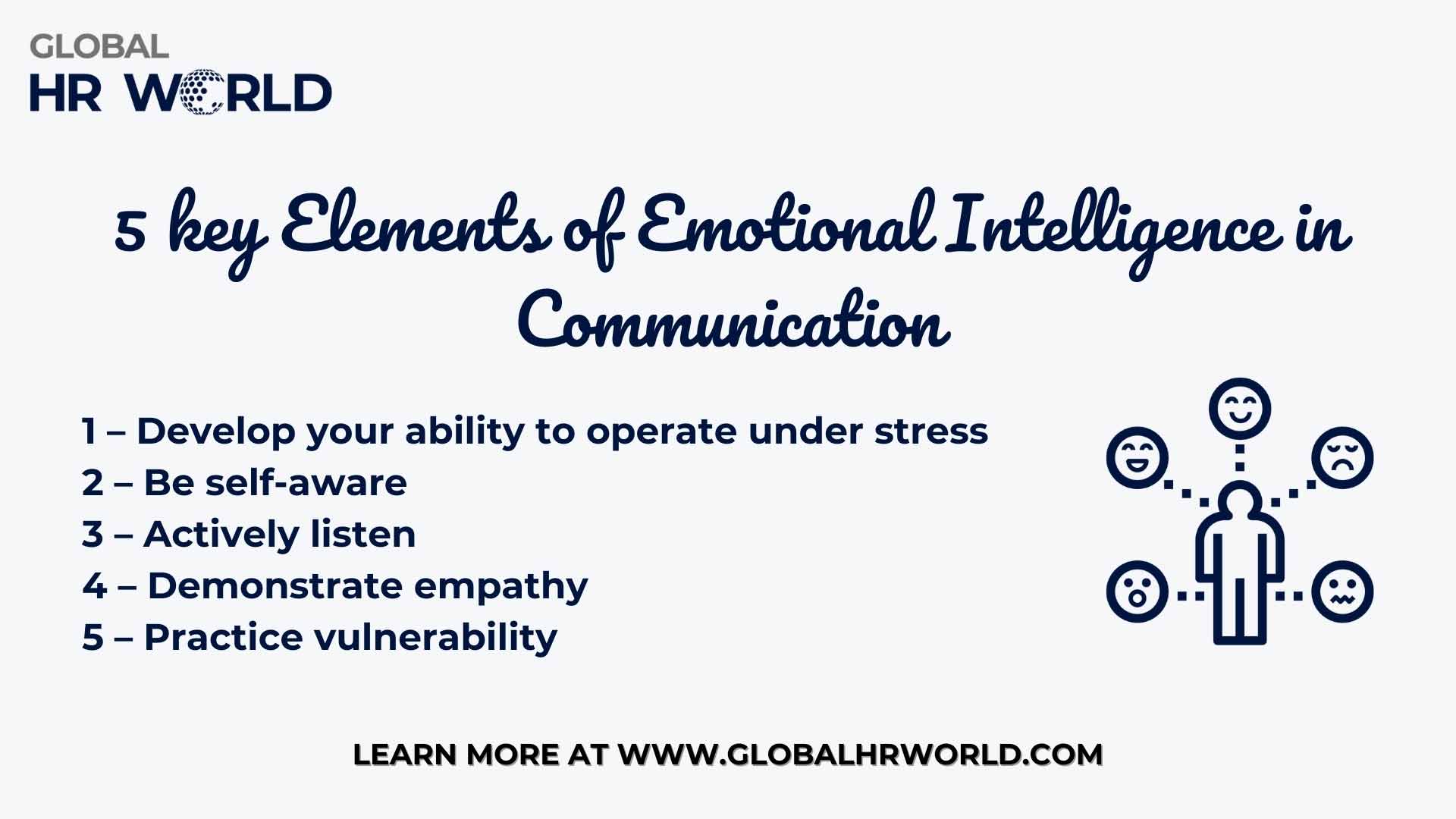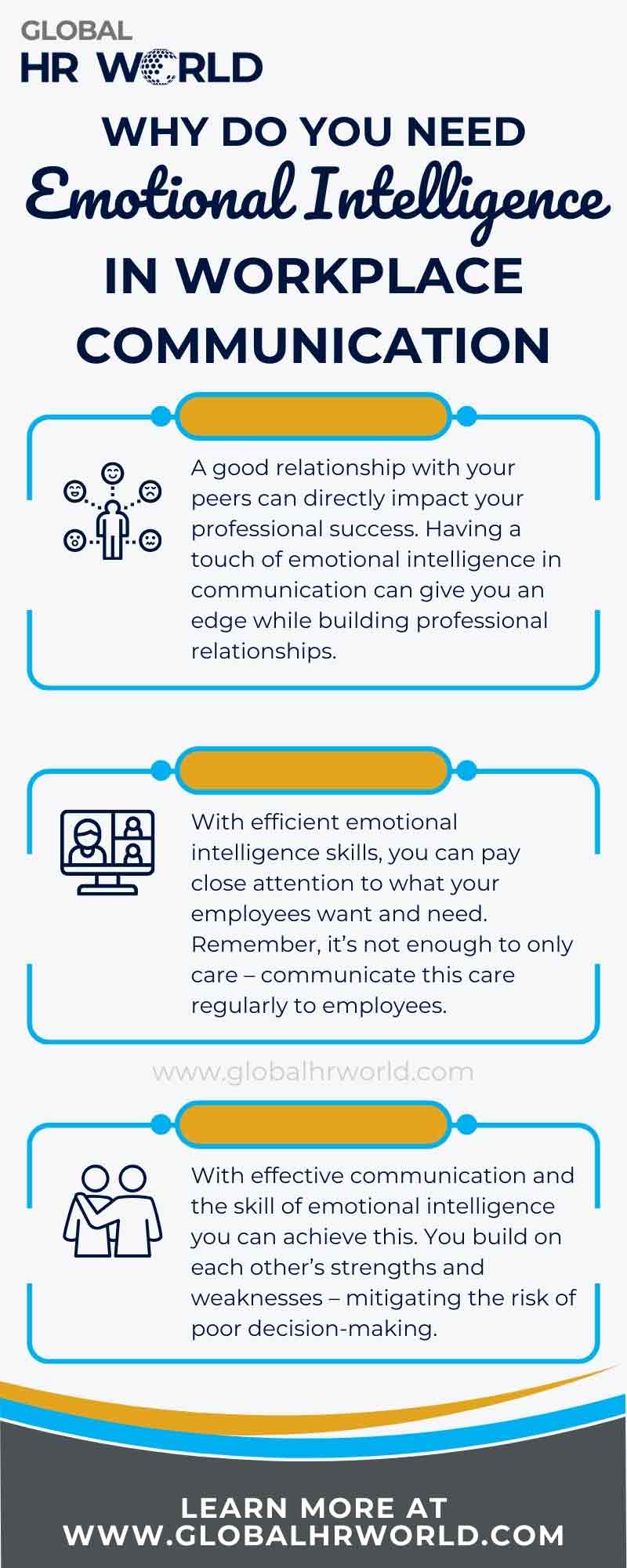Emotional intelligence in communication is an important aspect of workplace communication. Regardless of the field you work in, the position you work in, it is important that you have emotional intelligence. Not sure what it is? Then you are in the right place!
What is emotional intelligence (EQ) in communication
In the year 1990, psychologists John Mayer, Ph.D., and Peter Salovey, Ph.D., professors at the University of New Hampshire and Yale University, coined the term emotional intelligence (EQ). They published their research saying emotional intelligence is vital to understanding a person’s overall intelligence. They described it as “the capacity to be aware of, control and express one’s emotions, and handle interpersonal communication wisely and empathetically”.

In a nutshell, someone with strong emotional intelligence in communication understands and manages their own emotions/thought process, but they also recognize others’ emotions and use that capability to guide behavior and decision-making.
How can you use emotional intelligence (EQ) to improve communication
Here are some ways you can use emotional intelligence to improve communication:

Let’s discuss.
1 – Develop your ability to operate under stress
Have you noticed how emotionally intelligent people tend to be better able to manage stress. High EQ can help you handle issues that cause stress by enabling you to speak up for yourself, communicate your needs, stay focused on goals, and collaborate with others effectively. What’s more? high EQ helps people
- adapt to change,
- maintain a positive viewpoint, and
- stay calm in the face of challenges.
If you struggle to manage stress, it can inhibit your ability to demonstrate emotional intelligence. Under stress, you are likely to focus on direct actions that reduce perceived threats. These actions that occur under stress can send the wrong message to others and create additional long-term problems that cause even more stress.
2 – Be self-aware
Being self-aware can be considered the highest level of emotional intelligence. It involves regulating our emotions properly and being able to respond to others’ emotions in a professional manner. Relationships in the workplace can be affected by how we manage our own emotions. Our understanding of our own emotions plays a crucial part in understanding people those around us. When you know how to feel you can communicate what you feel. It creates the pillar of effective communication. Ineffective communication or lack of emotional intelligence can lead to conflict, misunderstanding, and effect overall well-being. The capability to be self-aware impacts your overall communication abilities in both one’s personal and professional life. Being self-aware is the first step toward it.
To build self-awareness:
- Reflect on your own core values and beliefs
- Be realistic about your strengths and weaknesses
- Have self-acceptance and self-regard, even if it’s your faults
- Know how you are perceived by others, but don’t overindulge yourself in it
- Manage emotions by acknowledging your triggers, the incidents, people, or crisis situations that cause you to have strong emotional reactions
3 – Actively listen
Active listening is when you not only hear what the other person is saying but also attune to their thoughts and feelings. It turns a one-way conversation into a two-way interaction. Active listening is not always easy. Here are some active listening tips for you,
- Pay close attention to the speaker’s behavior and body language
- Signal that you’re listening with visual cues like nodding and eye contact
- Ask clarifying questions to ensure your understanding
- Keep an open mind
- Simply make the speaker feel heard and validated
- Confirm you have understood what the speaker has said by verifying your understanding
4 – Demonstrate empathy
When people talk about empathy, they might be referring to a few different qualities that are important for emotionally intelligent communication:
- Valuing others’ feelings
- Reading and understanding others’ emotions
- Making others feel validated and understood
Empathy is needed to build trust in any relationship. Whether someone values others’ feelings roughly equates to whether they value meaningful relationships. A willingness to be emotionally vulnerable makes interactions more meaningful, building trust. However, you don’t have to be perfect. Even if you misidentify someone’s emotions, you’ll build trust just because you made the effort. You might think that it is risky to acknowledge emotions in a professional setting, but that’s exactly why you should do it. It is the best way to communicate effectively and build trust.
5 – Practice vulnerability
It can be scary to show a part of yourself that’s imperfect. And the more senior you are, the more pressure there tends to be to present a flawless exterior. When people see that showing emotion is OK, a culture of openness can start to form. Examples of being vulnerable can be,
- Sharing personal details that you normally keep private
- Allowing yourself to process and express difficult emotions like shame, grief, or fear
- Reconnecting with someone you’ve fallen out with
- Being honest about your needs in a relationship
In the workplace, vulnerability can transform professional relationships and team dynamics. Admitting mistakes, asking for help, and sharing challenges can promote a culture of collaboration, support, constructive feedback, and continuous improvement.
The importance of emotional intelligence in communication
By building emotional intelligence and your communication skills as a result, you can:
1 – Improves your professional relationships
Regardless of the field you work in, having relationships with your associates/peers can directly impact your professional success. So, knowing how to build relationships is a valuable skill. Having a touch of emotional intelligence in communication can give you an edge while building professional relationships. More so, having employees who have positive relationships with each other is not only beneficial for the employees’ morale and well-being, it is beneficial also for the organization as a whole. Besides having positive professional relationships can improve your own productivity and job-related skills. People who enjoy working with their peers tend to consciously and unconsciously work more hard, as they enjoy their current position and want their organization to do well in the future.
2 – Achieves greater work satisfaction and happiness
It is important to remember that job satisfaction and happiness varies from employee to employee. In the same work environment under the same conditions, the factors that help one employee feel good about their job may not look fulfilling to another employee. For this reason, it is essential to have effective communication between you and your employees. With efficient emotional intelligence skills you can pay close attention to the fact what your employees want and need. Remember, it’s not enough to only care – communicate this care regularly to employees. When employees see that you care their productivity level also increases. It is a win-win situation.
3 – Facilitates collaboration on your team
Whether you’re a leader or an employee, you need to hone the right skills and mindset to gel and facilitate effective collaboration. With effective communication and the skill of emotional intelligence you can achieve this. When you are working in a collaborative environment it feels like socializing with like-minded people. When you have different minds coming up with different solutions to the same problem, you are bound to arrive at the best solution. You build on each other’s strengths and weaknesses – mitigating the risk of poor decision-making.
4 – Enhances your leadership development
If you are leading a team with multiple employees or multiple teams working on diverse projects, leadership communication skills become even more crucial. When you understand how crucial emotional intelligence in communication is for leading your team members and increasing productivity, you can take specific steps to improve your skills. Emotional intelligence in communication in leadership is important as it enables you to take responsibility for your team and convey your message in clear, unambiguous terms. With this skill, you can set the tone for your workplace and make it easier for your team members to understand your work expectations. It helps you create an atmosphere where they feel comfortable expressing themselves and getting feedback.
So, how can you build your emotional intelligence and communication skills? Comment below.
Infographic

Knowledge Check!
Frequently Asked Questions (FAQs)
What is emotional intelligence in communication?
People with emotional intelligence in communication understands and manages their own emotions/thought process, but they also recognize others’ emotions and use that capability to guide behavior and decision-making.
What are the keys of emotional intelligence?
The 5 key elements of emotional intelligence in communication:
1 – Develop your ability to operate under stress
2 – Be self-aware
3 – Actively listen
4 – Demonstrate empathy
5 – Practice vulnerability
Why emotional intelligence in communication is important?
Emotional intelligence in communication is important as it enables you to take responsibility for your team and convey your message in clear, unambiguous terms.



